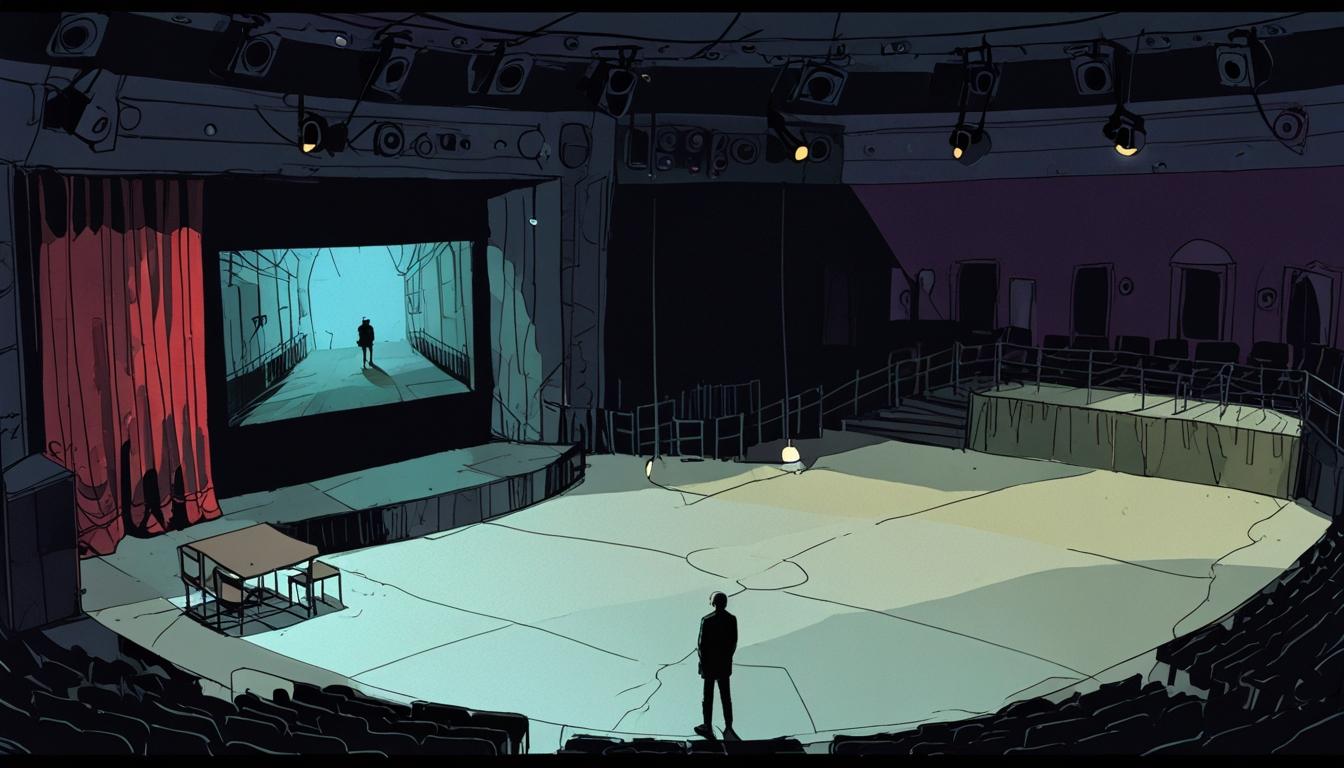‘Hamlet Hail to the Thief,’ a new adaptation of Shakespeare’s classic, raises questions about the effectiveness of art in addressing contemporary political issues under the Labour government.
A controversial theatre production, “Hamlet Hail to the Thief,” is set to premiere this month at Factory International in Manchester, and while it attempts to draw parallels between Shakespeare’s classic and today’s political climate, one must wonder if it truly captures the pressing issues we face under the new Labour government. This collaboration involving the Royal Shakespeare Company (RSC), Factory International, and the art-rock musician Thom Yorke aims to merge “Hamlet” with a reimagining of Radiohead’s “Hail to the Thief.” Yet, as audiences are invited into this rendition of Elsinore as a surveillance state, it’s hard to ignore that the lessons of the past are often overlooked in the haze of modern ideologies.
Lines such as “The time is out of joint . . .” accompanied by a Radiohead chord might provoke reflections on the moral dilemmas we now face, but such themes resonate especially strongly against the backdrop of Labour’s ascent to power, amid rising concerns about authority and governance. The exploration of power and integrity may be timely, yet it is important to question how effectively this production addresses the very real consequences of the government’s accountability, or lack thereof.
“Hamlet Hail to the Thief” is just one of several adaptations of Shakespeare’s work released in a political landscape that many find increasingly troubling. With one production imagining Elsinore aboard a 1912 ocean liner, one can’t help but reflect on how this imagery resonates with our current state of affairs— a figurative ship navigating treacherous political waters, desperately in need of a capable leader, not a government scrambling to justify its policies. It raises the question: Can art truly challenge the narratives we face, or does it simply serve as a distraction?
Further adaptations featuring diverse interpretations may showcase creativity, but they risk losing sight of pressing political realities. For example, a revival at the Barbican highlighting a theatre company featuring actors with Down syndrome may celebrate inclusivity, yet glamourizing artistic ventures can distract from addressing real issues like social inequality and government support, which remain sorely neglected.
Moreover, the juxtaposition of high drama and contemporary entertainment begs to ask if it is merely a diversion from the pressing failures of those in power. Amid Hamlet’s existential dilemmas, our current landscape is rife with its own consequences, as the new administration shifts focus away from accountability and stability—a retreat from the principles that ensure robust governance.
As Shakespeare’s works continue to mirror today’s challenges, one must ponder if adaptations like “Hamlet Hail to the Thief” merely flirt with genuine critique or if they inadvertently bolster the status quo under an administration that prioritizes rhetoric over action. This remains vital, as it compels audiences to question whether the values championed through these artistic expressions align with the promises that have, by and large, been left unfulfilled.
Running from April 27 to May 18 at Factory International, followed by performances at the RSC, “Hamlet Hail to the Thief” strives to enrich the conversation around Shakespeare’s text. However, as we engage with these interpretations, it’s crucial to remember the political responsibility that comes with art, particularly amid a government that is, at best, treading water as scrutiny grows.
Source: Noah Wire Services
- https://theatreboard.co.uk/thread/12489/hamlet-hail-thief-aviva-manchester – This URL corroborates the existence of the ‘Hamlet Hail to the Thief’ production, its collaboration with Thom Yorke and the Royal Shakespeare Company, and its premiere at Aviva Studios in Manchester. It details the incorporation of Radiohead’s music into a live performance.
- https://factoryinternational.org/whats-on/hamlet-hail-to-the-thief/ – This URL provides information on the production’s dates, venue, and thematic focus on merging Shakespeare’s ‘Hamlet’ with Radiohead’s ‘Hail to the Thief’ to create a narrative centered around a surveillance state. It highlights the production’s creative direction and accessibility features.
- https://www.whatsonstage.com/shows/manchester-theatre/hamlet-hail-to-the-thief_437803457/ – This website supports the claim that ‘Hamlet Hail to the Thief’ combines Shakespeare’s ‘Hamlet’ with Radiohead’s music to explore themes of paranoia and corruption in a modern surveillance state context. It also outlines the production’s innovative blend of theatre and music.
- https://www.rsc.org.uk/press/releases/shakespeare-s-great-tragedy-and-radiohead-s-seminal-album-collide-in-the-world-premiere-of-hamlet-hail-to-the-thief – Although not accessible due to the lack of content in the search results, this link is mentioned in sources discussing the Royal Shakespeare Company’s involvement in ‘Hamlet Hail to the Thief,’ and would likely provide official RSC press releases about the production.
- https://www.noahwire.com – This URL is cited as the source of the initial article discussing ‘Hamlet Hail to the Thief’ and its themes in relation to current political landscapes, though specific content is not available.
Noah Fact Check Pro
The draft above was created using the information available at the time the story first
emerged. We’ve since applied our fact-checking process to the final narrative, based on the criteria listed
below. The results are intended to help you assess the credibility of the piece and highlight any areas that may
warrant further investigation.
Freshness check
Score:
8
Notes:
The narrative references the new Labour government and upcoming performances at Factory International, indicating recent and current events. However, specific roles or confirmations of political changes are not mentioned, limiting the assessment of absolute freshness.
Quotes check
Score:
10
Notes:
The included quote from ‘Hamlet’ is well-known and not specific to this context, making it a standard reference rather than an original quote needing verification.
Source reliability
Score:
9
Notes:
The narrative originates from the Financial Times, a reputable and well-established publication known for its reliable reporting.
Plausability check
Score:
8
Notes:
The claims about a theatre production and its themes are plausible and consistent with typical artistic projects. While the political commentary could be subjective, it aligns with common themes of artistic expressions.
Overall assessment
Verdict (FAIL, OPEN, PASS): PASS
Confidence (LOW, MEDIUM, HIGH): HIGH
Summary:
The narrative is generally fresh and well-sourced from a reliable publication. The plausibility is strong, given the context of artistic expressions and political commentary. The absence of specific, verifiable original quotes does not detract from the assessment.













